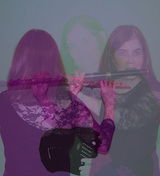"Without music, life would be a mistake."
Friedrich Nietzsche
In December, I was privileged to to be the soloist in the Prelude movement of John Rutter’s Suite Antique, played by the Stevenson String Group. Three flute players each took one movement.
I confess to having more than a few qualms when I learned that my movement was the Prelude, especially about the middle high section. I must have practiced that fast motif at least a thousand times, quite a few of them unsuccessfully. In the end, an adjustment to my left wrist position and a lot more practice ensured it came off on the night.
While last year, I felt very nervous performing, I seem to have become more confident, especially when I feel prepared enough. In the December concert, while there was a moment of inattention and improvisation, I felt in control of my flute and the music, and that was a great feeling. It was also amazing to perform as a soloist, and to work closely with a conductor and accompanist! I may never get an opportunity like that again, but it was so wonderful to be standing up on the stage, playing, with an orchestra at my back!

Last week, for my Performance Assessment, I played the Rutter with piano accompaniment followed by Pal Jardanyì’s Sonatina for flute in three movements.
Pal Jardanyì was born in Budapest in 1920. (My maternal grandparents were also Hungarian, but they left Budapest at the turn of the century, emigrating to the US.) Jardanyì was a pupil of Kodaly, an avowed anti-fascist who assisted and sheltered Jews during WWII, and a supporter of the 1956 Hungarian Uprising for which he was subsequently dismissed from his position at the Academy of Music in Budapest. He was interested in ethnomusicology, and in 1960 became Head of the Department at the Folk Music Research Group, Hungarian Academy of Sciences. He was only 46 when he died.
The Sonatina for flute was written in 1952 for the Hungarian flautist Zoltan Jeney. It’s a lovely, expressive work with several changes of mood packed into a short piece. Originally, I felt it might be too modern for me to relate to, but I have thoroughly enjoyed playing it. It’s been a kind of journey towards understanding the music, finding meaning and then expressing that meaning. In my mind, there are themes of the end of WWII, sadness, and regeneration. It amused me, therefore, to accidentally discover, only on the day of the performance, that the Sonatina is subtitled in Hungarian, “Hajdu” translated as “Hungarian Herding Songs”. I wonder whether knowing that would have changed my approach?
While overall I've been pleased with my performances, I know that I have a tendency to become sharp when playing loudly, and I need to learn how to project my sound more. That's what I'll be working on over the next few months.
Pal Jardanyì was born in Budapest in 1920. (My maternal grandparents were also Hungarian, but they left Budapest at the turn of the century, emigrating to the US.) Jardanyì was a pupil of Kodaly, an avowed anti-fascist who assisted and sheltered Jews during WWII, and a supporter of the 1956 Hungarian Uprising for which he was subsequently dismissed from his position at the Academy of Music in Budapest. He was interested in ethnomusicology, and in 1960 became Head of the Department at the Folk Music Research Group, Hungarian Academy of Sciences. He was only 46 when he died.
The Sonatina for flute was written in 1952 for the Hungarian flautist Zoltan Jeney. It’s a lovely, expressive work with several changes of mood packed into a short piece. Originally, I felt it might be too modern for me to relate to, but I have thoroughly enjoyed playing it. It’s been a kind of journey towards understanding the music, finding meaning and then expressing that meaning. In my mind, there are themes of the end of WWII, sadness, and regeneration. It amused me, therefore, to accidentally discover, only on the day of the performance, that the Sonatina is subtitled in Hungarian, “Hajdu” translated as “Hungarian Herding Songs”. I wonder whether knowing that would have changed my approach?
While overall I've been pleased with my performances, I know that I have a tendency to become sharp when playing loudly, and I need to learn how to project my sound more. That's what I'll be working on over the next few months.

 RSS Feed
RSS Feed